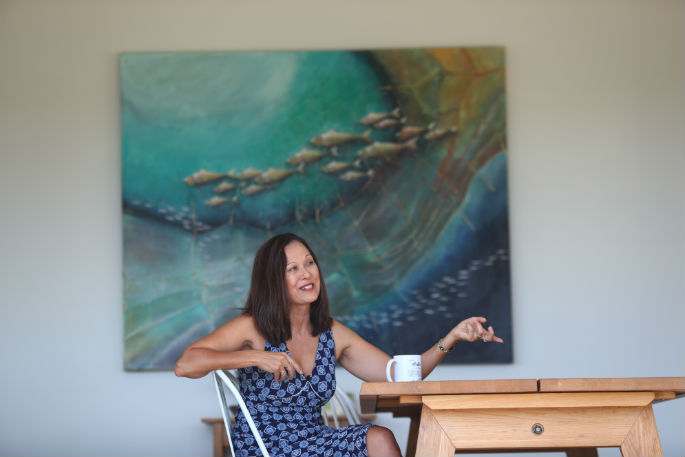I shivered as I drove into the Welcome Bay hills. On my way to meet New Zealand's top horror writer, I wondered whether she lived in a house that was eerie, underworld or gothic.
Maybe a dark, derelict 1930s rambling wood batten mansion, with turrets, alcoves and bay windows along with a black cat, some bats and plenty of cobwebs.
This was, of course, an oversimplified, unfortunate idea. My concept of ‘horror fiction' is ill-informed, but how badly off-track is it?
Knocking at Lee Murray's door, I found myself greeted by Bella the Houdini dog, and Colleen Shervell's abstract paintings, showering colour into a light and airy room.
Lee has been nominated and shortlisted in two categories of the Horror Writers Association's International Bram Stoker Award, for anthology and short fiction.
She is the only New Zealander to reach the finals in two categories, and the only first-time nominee to appear on the shortlists both as a writer and an editor in the same year. She's a double Bram Stoker Award-nominee.
This is the equivalent of being nominated for an Academy Award in film, and she lives right here in Tauranga.
Lee is in well-respected company, with author-editor Marty Young, who was a co-nominee for Macabre: A Journey Through Australia's Darkest Fears in 2010, and screenwriter Taika Waititi, who was a nominee for What We Do in the Shadows in 2015.
Named in honour of the author of the seminal horror novel Dracula, the Bram Stoker Awards are presented annually for superior achievement in writing in 11 categories, including traditional works of various lengths, poetry, screenplays and non-fiction.
Previous winners include Stephen King, JK Rowling, George RR Martin, Joyce Carol Oates and Neil Gaiman.
She also has ten Sir Julius Vogel awards sitting on a bookcase.
As I've mentioned, I had odd notions about horror writing. Lee sent me Dead End Town - a short story she'd written. I read it immediately, finding myself drawn in to the monstrous world of a child subjected to the shock of loss of relationships and abuse from adults, with no way out.
HP Lovecraft, an American writer of horror, once wrote: 'The oldest and strongest emotion of mankind is fear, and the oldest and strongest kind of fear is fear of the unknown.”
The short story took me to a place where people don't have a voice, where they become isolated and consumed by the knowledge that they can't do anything about their situation. I realised that I, myself, had experienced this. Afterwards, I looked up ‘gas-lighting'.
'The essence of horror is to investigate what makes us frightened,” says Lee.
'How would we deal with it? What would this character do in this situation? How do we manage our internal fears?
'If your life is broken, what would you do? Don't go back into the haunted house, and don't go back for the cat!
'Grimm's Fairy Tales influenced me. Pinocchio is really scary - using the skins of children for drums. Hansel and Gretel – fattening children to eat them.”
Parents discarding their children, and the desperation of children being separated from their parents, is something that resonates in today's world.
'When something horrific happens, we often have no blueprint, we don't know how to deal with it,” says Lee. 'There's no life experience to fall back on.
'Every story has to have a satisfying resolution. You set up a contract with your reader. If there's a romance, you expect the two lovers will get together. If it's a mystery, then you want to know who did it.
'A cowboy has a shoot-out. A thriller has a race against time. Will you survive?
'With horror, we're going to test your fears. I'm going to find out what makes you uncomfortable.”
Not knowing where the danger is coming from and playing on uncertainty seem to be the essence of writing a good horror story.
Lee has delved into darker fiction, and explored deeper feelings and fears - lost tribes, a taniwha, Lake Taupo exploding, prehistoric and primordial tapestries.
There's ideas of community and culture, telling one story from half-a-dozen perspectives in her ensemble novels and allowing for different aspects of nuanced truth. There are many dark overlays of meaning.
'With NZ culture we have to tread carefully, because one person's mythology will be someone else's faith,” she says. 'We have to be sensitive how we approach these stories.
'Editing is all about precision and how to get the most out of a sentence. I'm a Marie Kondo type of editor,” she says, smiling over the top of a coffee mug from her writing colleague Dan Rabarts. ‘I'm a writer, what's your super power?' is emblazoned on it.
Over summer, she read 87 manuscripts, judging them for a national writing competition while curled up in her hanging seat outside.
'I've applied for funding 36 times and received funding zero times. Writing salaries have not improved in recent years.
'It takes me all day to write 1000 words,” she says. 'I'm not a natural writer. I'm a hard worker. As Ashton Kutcher says, ‘opportunity looks a lot like hard work'.”



0 comments
Leave a Comment
You must be logged in to make a comment.